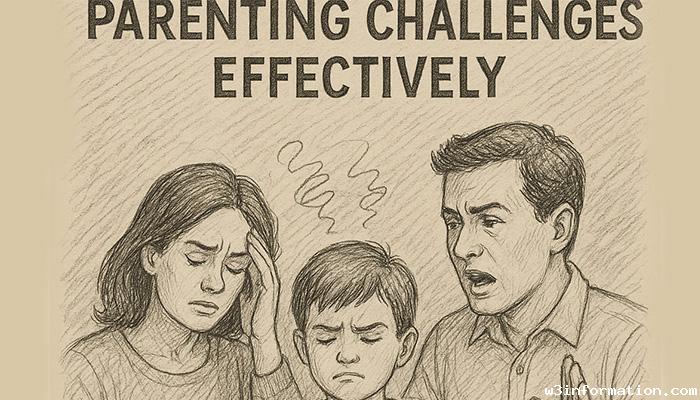How to Deal with Parenting Challenges Effectively
Parenting involves joyful experiences accompanied by love and growth alongside instances of doubt and stress. Parents encounter numerous obstacles as their children develop and situations change. This blog offers a systematic framework that helps parents comprehend and handle their parenting difficulties through empathy and strategic resilience.
Understanding the Roots of Parenting Challenges
Recognizing Common Parenting Issues:
The challenges parents face depend on factors like their child's specific age stage and personality along with their environmental context. Some commonly reported issues include:
1)Behavioral issues parents encounter commonly include tantrums and aggressive behavior alongside defiant actions
2)Communication gaps between parents and children
3)Academic pressure and performance anxiety
4)Balancing screen time and outdoor activity
5) Teenage identity crises and peer pressure
6)Sibling rivalry or family conflict
7)Parental guilt or burnout
8)Recognizing these challenges as common experiences can make parenting feel more normal while helping parents avoid feelings of isolation and inadequacy.

The Impact of Parenting Style
Different parenting methods determine the ways families handle their difficulties. Developmental psychology outlines four essential parenting approaches as follows:
Authoritative: High warmth and structure—linked to positive outcomes
Authoritarian: Parents who use authoritarian methods combine strict control with minimal warmth which results in children who obey but lack self-esteem.
Permissive: When warmth surpasses structure in parenting methods it often leads to poor boundary setting.
Neglectful: Parenting approaches that lack both warmth and structure often result in developmental delays and low motivation in children.
Parents who understand their default parenting style can modify their approach to achieve better outcomes.
Strategies to Handle Parenting Challenges
1. Build Emotional Intelligence in Parenting:
Parents practicing emotional intelligence must recognize and understand emotions and regulate both their children's emotions and their own emotional responses.
Tips:
Acknowledge your child’s emotions even when their actions seem unacceptable.
Use “I” statements to express your concerns: It makes me worried whenever you’re not home when you’re supposed to be.
Teach children emotional vocabulary and coping mechanisms.
2. Practice Active Listening:
The majority of difficulties emerge when people fail to connect and understand one another. Active listening fosters trust and reduces resistance.
How to do it:
1)Give full attention (put away distractions)
2)Reflect back what you hear: The way you talk suggests you experienced neglect during school time.
3)Avoid immediate advice or judgment
4)Children who experience this practice become more receptive to guidance because they feel acknowledged and understood.
3. Set Clear and Consistent Boundaries
1)When children learn what behaviors lead to consequences they perform better. Clear boundaries provide safety and structure.
2) Effective boundary-setting includes:
3)Involving children in rule-making (especially older children)
4)Explaining the why behind rules
5)Enforcing consequences calmly and consistently
6)Respect and accountability grow through consistent discipline which avoids harsh actions.
4. Model Desired Behavior
Children often imitate adults. Positive behavior modeling delivers more effective life lessons than any lecture can.
.Model Desired Behavior
Children often imitate adults. Positive behavior modeling delivers more effective life lessons than any lecture can.
Modeling includes:
1)Expressing emotions in healthy ways
2) Apologizing when wrong
3) Practicing patience, empathy, and gratitude
4)Children learn to adopt values more effectively when parents demonstrate those values through their actions.
5) Encourage Autonomy and Problem Solving
Developing self-sufficiency in children leads to increased self-assurance and accountability in their actions.
Ways to support this:
1)Provide age-appropriate options by asking which they prefer to complete homework before or after dinner time.
2)Guide rather than solve: How do you think you could best remember your assignments?
3)Celebrate efforts, not just results
4) Natural consequences experienced by children within safe parameters help develop their sense of accountability.
Toddlers and Preschoolers
Common issues: Tantrums, separation anxiety, sleep troubles
Navigating Specific Age-Based Challenges
Toddlers and Preschoolers
Common issues: Tantrums, separation anxiety, sleep troubles
Solutions:
1)Maintain routines for predictability
2)Offer limited choices to reduce power struggles
3)Use distraction and redirection instead of punishment
4)School-Aged Children
Common issues: Academic pressure, social conflicts, self-esteem
Solutions:
1)Show interest in their day and friendships
2)Reinforce effort over perfection
3)Teach conflict-resolution skills and assertive communication
Teenagers
Common issues: Identity exploration, peer influence, rebellion
Solutions:
1)Maintain open, nonjudgmental communication
2)Set flexible but firm limits
3)Support their personal boundaries and freedom while remaining engaged in their lives
Managing Parental Stress and Burnout
1. Acknowledge Your Limits
Parenting does not require perfection. Parents should understand that having difficult days is acceptable and requesting assistance is fine.
1)Distribute parenting tasks among your partner and reliable caregivers.
2)Join parenting support groups or forums
3) Seek professional counseling if overwhelmed.
. Prioritize Self-Care
When parents prioritize their own well-being they become more effective at caring for their children.
Self-care strategies include:
1)Regular sleep, nutrition, and physical activity
2)Mindfulness practices like meditation or journaling
3)Scheduling personal time (even if brief)
3. Practice Compassion Toward Yourself
1)Self-compassion is essential. Replace harsh inner criticism with kindness.
2)Instead of: I’m not perfect but I’m putting in my best effort.
When to Seek Professional Help:
1)Professional help becomes useful when home management methods fall short in addressing parenting challenges.
2)Consider reaching out if:
3)You notice symptoms of depression, anxiety or withdrawal in your child
4)Chronic stress from parenting combined with ongoing conflict and emotional turmoil indicates the need for professional support.
5)Family operations become disrupted because of behavioral problems.
6)Your family is going through major changes because of divorce or traumatic events or because you have moved to a new location.
7)Your unique situation can benefit from guidance offered by child psychologists and family therapists who specialize in personal counseling.
Conclusion
Parenting requires continuous adaptation because it does not have a universally correct method. Parents who remain vigilant and flexible while obtaining help when necessary can transform parenting difficulties into chances for building stronger bonds and personal development. The application of patience alongside empathy and consistent behavior transforms difficult parenting moments into opportunities for developing resilient and emotionally intelligent children who gain confidence.
 DIY Holiday Decor Ideas on a Budget
DIY Holiday Decor Ideas on a Budget
 How to Create a Healthy Meal Plan for the Week
How to Create a Healthy Meal Plan for the Week
 Discover your top 10 comforting meals to enjoy during the winter season
Discover your top 10 comforting meals to enjoy during the winter season
 Tips for Stress-Free Holiday Travel
Tips for Stress-Free Holiday Travel
 Mobile Video Editing Apps to Try
Mobile Video Editing Apps to Try
 Mobile Health Apps: Best of 2025
Mobile Health Apps: Best of 2025